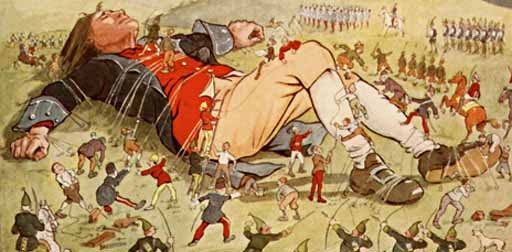“He observed, how contemptible a Thing was human Grandeur, which could be mimicked by such diminutive Insects as I.”
Part II, Chapter Three, p 93,
Gulliver’s Travels, Swift, J. 1735.
Jonathan Swift’s Gulliver’s Travels (censored version published 1726, and unabridged version in 1735) serves as a biting satire on society through its use of allegory (i.e extended metaphor) in political terms. A satire is a (usually humorous) work of fiction that uses sarcasm and irony to mock the pathetic nature of humanity. In the 18th century, satire had become a famous form and Swift, among others, employed it in their works. He ensures that his novel is both amusing and critical, attacking British and European society through its imaginary countries. Bending reality to make ordinary things seem strange and unfamiliar, Swift depicts human customs as weird and alien, asking readers examine them from a fresh lens. He makes everything, from religious and political differences to maths and science, seem frivolous and ridiculous. He moreover finds nearly everything about humans repulsive- particularly their smells, reflecting them back to the reader in creatively disgusting ways.
Swift devotes the initial description in this voyage (Chapter One) to elevated ideas of English life and properness, talking of prestigious universities and a typical lifestyle, only to satirise it later in the text. This later criticism of the very thing he exalts serves to removes all illusions and prevention from the mind of the reader as the average Englishman. He mocks even his own narrator (who is at times based on Swift himself) and thus the description of his family life is not done to endear him to the readers. Further, this offering of his background allows the text to read like the popular travel books of the age, making it seem closer to reality, which is necessary when attempting to mock that reality. The travelogue technique helps exaggerate the absurdity of the incidents, as well as keeps it relevant through its report style. He also points at the economic crisis in England, bringing attention to the deplorable state of society.
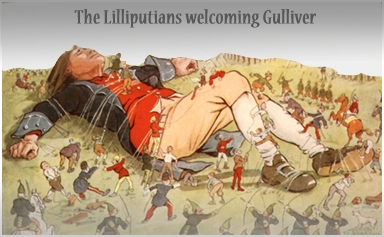
Moreover, the fact that Gulliver embarks upon a journey to explore new lands after his business fails is reminiscent of England’s own imperialist tendencies of sustaining its economy on its colonies, through the ‘drainage of wealth,’ as Dadabhai Naoroji later termed it. His preoccupation with what would or “would not be proper” (Swift, J. Part I, Chapter One, page 20. 1735.) thus seems ridiculous, as did England’s when its economy was dependant on other nations that it mocked for being ‘savage.’ These colonial sentiments can also be seen to be ridiculed by Swift upon his arrival at Lilliput, where he shows the Lilliputians to be using primitive weaponry, as he describes, “a bow and arrow in his hands, and a quiver at his back,” reflecting England’s perception of other races as inferior. Gulliver also refers to their foreignness in patronising terms, referring to their “shrill but distinct voice” and “very shrill accent” twice in one passage (Swift, J. Part I, Chapter One, page 21. 1735). He further talks of their strange language to alienate them. Edward Said later talks about this attempt at attributing negative qualities to foreign lands (as the ‘other’) so as to assert their own superiority in his book Orientalism (1978). As Dr. Sutapa Dutta of Delhi University writes in The Making of Nation and National Identity: A Study of Early English Novels (2013),
“While Behn and Defoe [who have written other travelogues] had shown us only one side of the coin, Swift dares to demonstrate that no colonial discourse can be unambiguously one-sided. Rather, it is open-ended, totally dependent on who sees what and at what point of time. Swift exposes the inconsistencies and fragmentation of a society that tries to legitimise colonialism.”
The Lilliputians, here – like the English- show excessive pride in themselves. The tiniest race visited by Gulliver is ironically represented as by far the most vain and smug. There is no character more repellent than Skyresh; there is more conspiracy in Lilliput than anywhere else; there is the pettiness of small minds thinking themselves grand. Gulliver naïvely buys into the Lilliputians’ imaginings, flattered by the attention of their royals and fearing their threats of punishment, despite their having no real physical power over him. Their formally-worded condemnation of Gulliver is a model of pompous and self-important speech, but it works effectively on him.
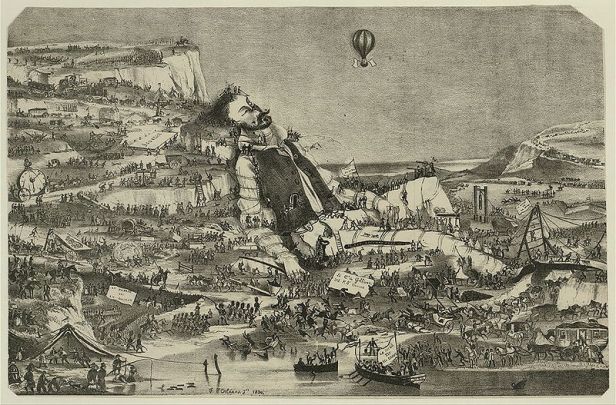
This may be a way of destabilising humanity’s position at the centre of the universe by demonstrating that size, power, and significance are all relative. Although the Lilliputians are pitifully small next to Gulliver, they do not see themselves that way, mirroring the way that England sees itself. That Gulliver may himself be the Lilliputian to some other nation’s Englishman is implied (as he finds is true in the second voyage, to Brobdingnag), just as England may easily be destroyed by another, larger, more powerful nation. Despite their threats, Gulliver could crush the Lilliputians by simply walking carelessly. The humour comes from the Lilliputians’ view of the situation; despite all evidence, they never realise their insignificance. They keep Gulliver tied up, believing that they can control him, while in truth he could destroy them effortlessly. In this way, Swift satirises humanity’s pretensions to power and significance.
They, further, show off to themselves, as well. Armies proudly marching are mentioned in no other society but Lilliput and Blefuscu where the minuscule inhabitants feel the need to display their glory so. When the Emperor requests that Gulliver serve as a makeshift Arch of Triumph, it is a pathetic reminder that their grand parade—while Gulliver’s nether regions are on full display—is supremely silly. The falling apart trousers bring to attention the English preoccupation with appearances and their clothing being ‘correct’ while the Lilliputians symbolise misplaced human pride, and Gulliver’s inability to correctly identify it. Moreover, Gulliver is at times genuinely intimidated by them, the Lilliputians show that even someone relatively small can do a great deal of damage and should not be underestimated. This is a Machiavellian notion (of appearances being valued over actual virtues), and the Lilliputians successfully implement the idea Niccolò Machiavelli discussed in his treatise The Prince (1532), by coming across as menacing and powerful to Gulliver and themselves, despite not actually being so. This is a reference to England’s conflict with Ireland, where they were overconfident and bullying the smaller nation.
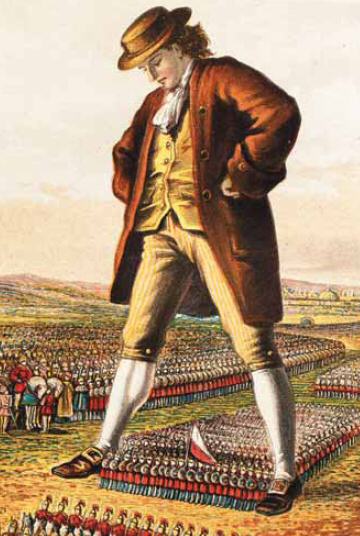
England is thus depicted with insufficiency, at least in the financial sense, which here matters most. It is left behind quickly in Chapter One, showing it as simply the starting point to be forgotten subsequently. Gulliver seems to have very few patriotic feelings for England, making Gulliver’s Travels unlike other travel narratives like Homer’s The Odyssey (approximately 700 B.C.E), in which Odysseus misses his homeland. Yet, Swift has Gulliver return home after each journey so that England is kept constantly in the picture and given a steady, implied importance. By the end of the final journey, England is brought more explicitly into the fabric of Gulliver’s Travels when Gulliver, in his confused instability, refers to Englishmen as Yahoos. The distinction between native and foreign thus unravels—these races do not simply populate a faraway land but rather are types that Gulliver projects on those around him. The possibility thus arises that the races Gulliver encounters are versions of the English and that his travels allow him to see human nature more clearly.
The writer also continually uses words such as ‘Europe’ and ‘England’ to establish the connection with real life. It is done to compare, invoke and remind the reader that the satire has not been set in a vacuum- pointing out the ridiculousness of these lands that Swift inhabits. This is seen in the phrases “as we do bombs in Europe” (Swift, J. Part I, Chapter One, page 21. 1735) and “like those that hang to a lady’s watch in Europe” (Swift, J. Part I, Chapter One, page 26. 1735). While we adopt Gulliver’s view momentarily, we can step back and recognise that the Lilliputians are a figment of Swift’s imagination. The distance between these two stances—the gullible Gulliver and the skeptical reader—is where the narrative’s levels of meaning are created; on one level is a true-life story of adventure; on another, a purely fictional fairy tale; and on a third level, a satirical critique of European pretence.
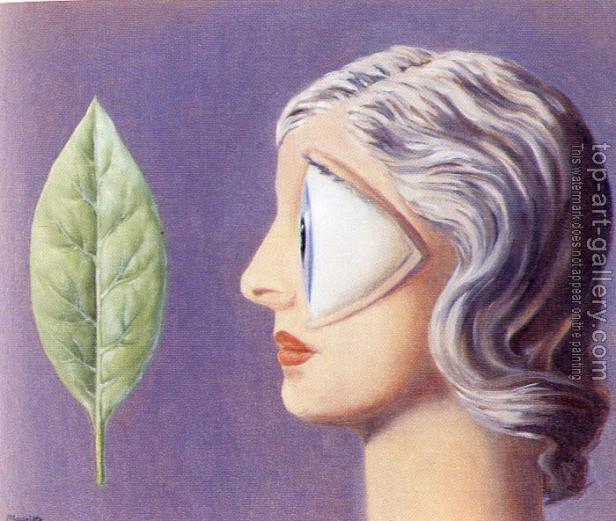
The Lilliputians are also seen to serve as a mockery of the king, as readily aggressive people, fiercely protective of their nation, but generally hospitable people willing to feed and shelter Gulliver. They are also “excellent mathematicians, and arrived to a perfection in mechanics by the […] encouragement of the Emperor, who is a renowned patron of learning.” (Swift, J. Part I, Chapter One, page 25. 1735.) This Emperor is thus much like Swift’s own, King George I, who was fond of maths and music. Gulliver discusses the politics of England with the King of Brobdingnag in the second part of the novel, greatly amusing him and thus highlighting the ridiculousness and smallness of English politics, shown from an alienated perspective. The King asks him “after an hearty Fit of laughing, [asks him] whether [he is] a Whig or a Tory” (Swift, J. Part II, Chapter Three, page 92. 1735.) deflating Gulliver’s pride and bringing down all of British politics to just the single, simply-put choice. This also reflects Swift’s own ambiguous position as a Whig or a Tory. Gulliver’s being flattered by the attention of royalty, despite being a silly plaything to them reveals his, as of the English, vanity and pretension.
Blatant satires of the British government and their pretence can be seen in the selection of Lilliputian officials: by a display of rope-dancing, which the Lilliputians consider appropriate but Gulliver finds arbitrary and ridiculous. They are literally made to jump through hoops to qualify for their positions. Swift here satirises England’s system of political appointments, inferring that it is arbitrary. Gulliver, however, does not imply that the Lilliputians are ridiculous. Throughout the novel, Gulliver is sympathetic to the cultures he visits, never criticising them or finding anything funny, no matter how ludicrous they may seem to the reader. Instead, Swift leaves the satire relying on the difference between how things appear to us and how they appear to Gulliver, heightening in this manner both the comedic as well as the critical impact.
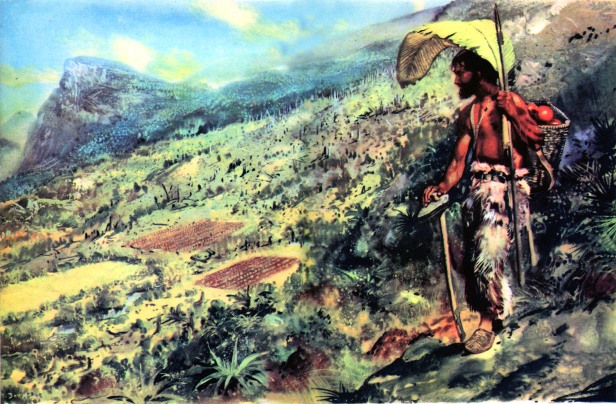
Furthermore, Swift plays with language that mocks humanity’s belief in its own importance. The papers Gulliver must sign to gain his freedom are presented in a formal, self-important language, while the document is meaningless and self-contradictory. Each article highlights the fact that Gulliver is powerful enough to violate all the articles without concern for his own safety. Similarly, when the Lilliputians draw up an inventory of Gulliver’s possessions, the whole endeavour is treated as a serious matter. The contrast between the tone of the inventory, given in the Lilliputians’ words, and the triviality of the possessions being inventoried, serves as a jab at people who take themselves too seriously- much like the English. This is a point of distinction from Daniel Defoe’s novel, Robinson Crusoe (1719), which propagates strong sense of Englishness and British superiority, through its display of ‘positive’ virtues such as inventiveness, a sense of recording time (implying proper English uprightness), taming an inferior creature, such as a dog or a native (reminiscent of colonialism). As Dr. Dutta of Delhi University propounds,
“For Defoe, the savage is the outsider who has to be tamed and educated. He believes that colonisation confers civilised benefits. From the English ethnocentric perspective, these places and people are legitimate objects for conquest and subjugation. On the contrary, the purpose of Swift’s satire is to deny the validity of this perception. His islands are already populated by the so-called civilised, cultured people who reveal their gross and ugly side. Swift’s satire presses forward from where Defoe left to reveal the worm at the core of eighteenth century English Empire.”
(From The Making of Nation and National Identity: A Study of Early English Novels, 2013.)
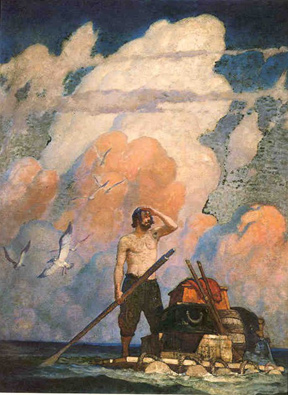
The conflicts in the novel that all seem trivial serve as metaphors for the present situation in England: the struggle between the high heels and low heels can be seen to represent that between the Whigs and Tories; Lilliput and Blefuscu represent England & France; the violent conflict between Big-Endians & Little-Endians symbolises the Protestant Reformation (and the centuries of warfare between Catholics and Protestants). These meaningless disagreements reflect the brutality of war, and show that Swift finds it futile. We can similarly conclude that it is Swift’s opinion that, just the way there is no value in war, there is no right or wrong way to worship God—at least, there is no way to prove that either way is right.The Big-Endians and Little-Endians both share the same religious text, but disagree on how to interpret a passage. It is suggested that the Bible can be interpreted in multiple ways, that it is absurd and hollow to fight over how to interpret it when no one can be certain in such a situation. His reporting this in a serious tone furthers the comedic impact, highlighting the triviality, as in a mock epic such as Dryden’s Mac Flecknoe or Pope’s The Rape of the Lock, which had just recently become popular, with their exaggerated descriptions of shallow occurrences serving to amuse. He thus critiques this religious and moral issue of ‘proper’ interpretations and writes off war. As M Wilding posits in ‘The Politics of Gulliver’s Travels’ (2014),
“He is questioning that any of the issues he deals with are serious, by comparing them to issues of the height of heels, or the end on which to break an egg. The huge disproportion between the triviality of those issues and their consequences in terms of political actions – involving death, rebellion, exile – express a huge contempt for the political.”
Gulliver’s urination incident, further, is associated speculatively with Queen Anne’s criticism of Swift’s work and her attempts to hinder his prospects with the Church of England. The event is shown as not merely an offence to the Lilliputians’ sense of decency, but also a suggestion of their insignificance, to which they respond resentfully. Although it prevents a disaster, the act asserts his control over the Lilliputians—even by the most irreverent actions. It shows the significance of physical power, that can turn a crude act into a lifesaving gesture. This also shows that, in Lilliput, practicality is forsaken for the sake of propriety. This further mocks English properness, which is valued over rationality, value or functionality—which are in fact the truly important things. This is also one of the instances where Swift employs excrement as a symbol to comment on society; he also used the image of flies defecating on his food in Brobdingnag.

Gulliver is also conscious of class differences and loves to be with “people of quality” (Swift, J. Part III, Chapter Two.), and believes in distinctions to be made between servants and the upper class. If there is mixing, noble families lose their so-called dignity. Gulliver is, himself, of the middle class and enjoys social mobility as a result, reflecting the hypocrisy in the sentiments of the British. While he approves of class distinctions on principle, he also appears to be disgusted enough to find the signs of the upper class proof that they are greedy and malicious. In this comes up a point of distinction from England—the islands all maintain strict divisions between the servant and upper classes, unlike England’s weakened aristocracy.
Gulliver’s analysis of Lilliput serves to illuminate the arbitrary nature of cultural, political and religious practices, as well as the fact that societies tend to assume certain customs to be natural. The Lilliputians do not question their norms because they, in their sheltered ignorance, believe in no other way to conduct affairs. When alternatives are discussed, the discussion ends in violent conflict. As readers, we are able to laugh at society at Gulliver’s expense through this satirical allegory that reveals the vile, petty, selfish and callous world, while also being provoked to think since for Swift, “Satyr is a sort of Glass, wherein Beholders do generally discover every body’s Face but their Own.” (Preface to The Battle of the Books in Williams 1982: 140)
Bibliography
- Defoe, D. Robinson Crusoe. W. Taylor. 1719.
- Dryden, J. Mac Flecknoe. 1692.
- Dutta, S. The Making of Nation and National Identity: A Study of Early English Novels. ESSE Journal, Albania, 4.1. 2013.
- Erskine-Hill, H. Swift: Gulliver’s Travels. Cambridge University Press. 1993.
- Hammond, B. Gulliver’s Travels. Milton Keynes. 1988.
- Higgins, I. Swift’s Politics: A Study in Disaffection. Cambridge University Press. 1994.
- Homer. The Odyssey. 7 B.C.E.
- Pope, A. The Rape of the Lock. 1712.
- Said, E. Orientalism. Pantheon, The University of Michigan. 1978.
- Swift, J. Gulliver’s Travels. Faulkner. 1726, 1735.
- Wagner, P. Reading Iconotexts: From Swift to the French Revolution. The Alden Press, Oxford. 1995.
- Wilding, M. The Politics of Gulliver’s Travels. Sydney Studies in Society and Culture. 2014.
- Wilson Knight, G. Poets of Action (incorporating essays from The Burning Oracle, 1939). Methuen and Co., 1967

